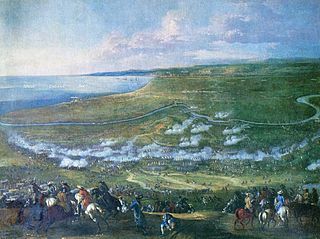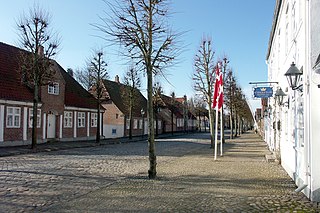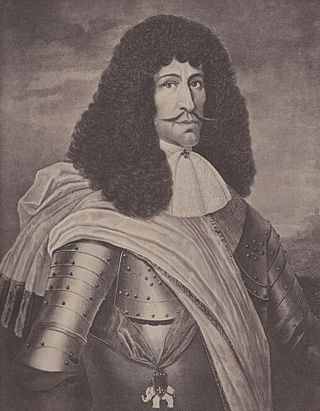Contents
| |||||
| Decades: | |||||
|---|---|---|---|---|---|
| See also: | Other events of 1676 List of years in Denmark | ||||
| |||||
| Decades: | |||||
|---|---|---|---|---|---|
| See also: | Other events of 1676 List of years in Denmark | ||||



1676 (MDCLXXVI) was a leap year starting on Wednesday of the Gregorian calendar and a leap year starting on Saturday of the Julian calendar, the 1676th year of the Common Era (CE) and Anno Domini (AD) designations, the 676th year of the 2nd millennium, the 76th year of the 17th century, and the 7th year of the 1670s decade. As of the start of 1676, the Gregorian calendar was 10 days ahead of the Julian calendar, which remained in localized use until 1923.

Christian V was king of Denmark and Norway from 1670 until his death in 1699.

Count Peder Griffenfeld was a Danish statesman and royal favourite. He became the principal adviser to King Christian V of Denmark from 1670 and the de facto ruler of the dual kingdom of Denmark-Norway in the first half of the 1670s. In 1673 he was appointed as Chancellor of Denmark, elevated to count, the highest aristocratic rank in Denmark-Norway, and received the Order of the Elephant, the country's highest order. At the behest of his enemies at court, Griffenfeld was arrested in early 1676 and convicted of treason, a charge that historians agree was false. He was imprisoned for 22 years, mainly at Munkholmen in Norway.

The Battle of Öland was a naval battle between an allied Danish-Dutch fleet and the Swedish navy in the Baltic Sea, off the east coast of Öland on 1 June 1676. The battle was a part of the Scanian War (1675–79) fought for supremacy over the southern Baltic. Sweden was in urgent need of reinforcements for its north German possessions; Denmark sought to ferry an army to Scania in southern Sweden to open a front on Swedish soil.

The Battle of Møn, also known as the Battle of Fehmarn, took place 31 May–1 June 1677, as part of the Scanian War. A smaller Swedish squadron under Admiral Erik Sjöblad attempted to sail from Gothenburg to join the main Swedish fleet in the Baltic Sea. It was intercepted by a superior Danish-Norwegian force under Niels Juel and decimated over the course of two days. The Swedes lost 8 ships and over 1,500 men dead, injured or captured, including Admiral Sjöblad himself, while the Danish losses were insignificant.
Schack may refer to:

Niels Juel was a Danish admiral and naval hero. He served as supreme command of the Dano-Norwegian Navy during the late 17th century and oversaw development of the Danish-Norwegian Navy.

The Scanian War was a part of the Northern Wars involving the union of Denmark–Norway, Brandenburg and Sweden. It was fought from 1675 to 1679 mainly on Scanian soil, in the former Danish and Norway provinces along the border with Sweden, and in Northern Germany. While the latter battles are regarded as a theater of the Scanian war in English, Danish, Norwegian and Swedish historiography, they are seen as a separate war in German historiography, called the Swedish-Brandenburgian War.

The Battle of Køge Bay was a naval battle between Denmark-Norway and Sweden that took place in bay off Køge 1–2 July 1677 during the Scanian War. The battle was a major success for Admiral Niels Juel and is regarded as the greatest naval victory in Danish naval history.

Claes Johansson Uggla was a Swedish military officer of the 17th century, who served in both the army and the navy, reaching the rank of Admiral before he was killed in action during the naval Battle of Öland.

Møgeltønder is a small town in Denmark, located in Møgeltønder Parish, Tønder Municipality, in the southwestern corner of the Danish peninsula of Jutland 5 kilometres north of the Danish-German border and 4 kilometres west of Tønder. Møgeltønder is known for its picturesque main street, the large 12th-century church, and Schackenborg Castle. As of 2023, it has a population of 787.
Events from the year 1719 in Denmark.
The following is a list of events that occurred in the year 1661 in Denmark.

Anna Sophie Schack, was a Danish noble and landlord.

Hans Schack was a member of the north German noble family Schack, who after many years in French service, entered the Danish service, made major contributions during the war with Sweden, and loyally supported Frederick III when he overthrew the Danish constitution. He became a Danish field-marshal, commander-in-chief of the Danish army, member of the Board of State, and of the Danish Privy Council, and made a Danish count.

Ernst Albrecht von Eberstein was a German Army Commander, Saxon Field Marshal and Knight in the Danish Order of the Elephant.
Otto Didrik Schack, Count of Schackenborg was a Danish nobleman and feudal count. He was the first holder of the County of Schackenborg from 1676 to 1683.

The County of Schackenborg was a Danish and for a period German majorat in the southern part of Jutland, which existed from 1676 to 1924.
Hans Schack, Count of Schackenborg was a Danish nobleman and enfeoffed count. He was the second holder of the County of Schackenborg from 1683 to 1719.
Otto Didrik Schack, Count of Schackenborg was a Danish nobleman and enfeoffed count. He was the third holder of the County of Schackenborg from 1719 to 1741.